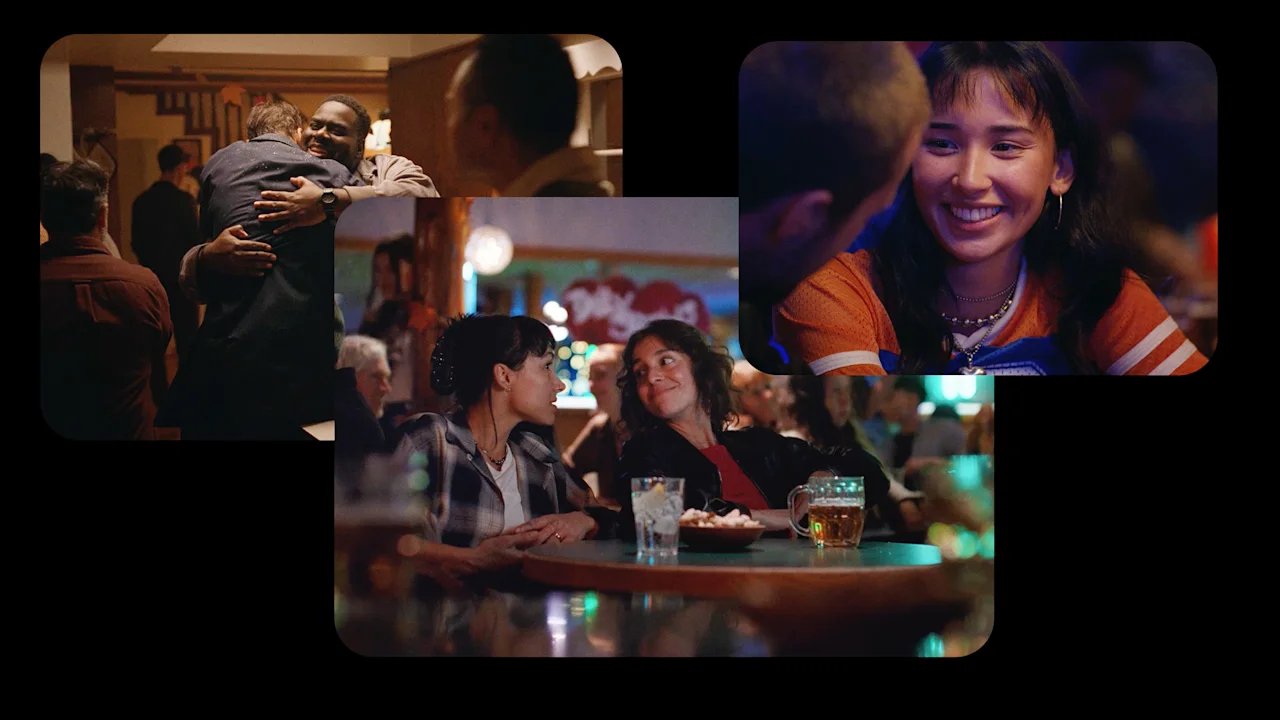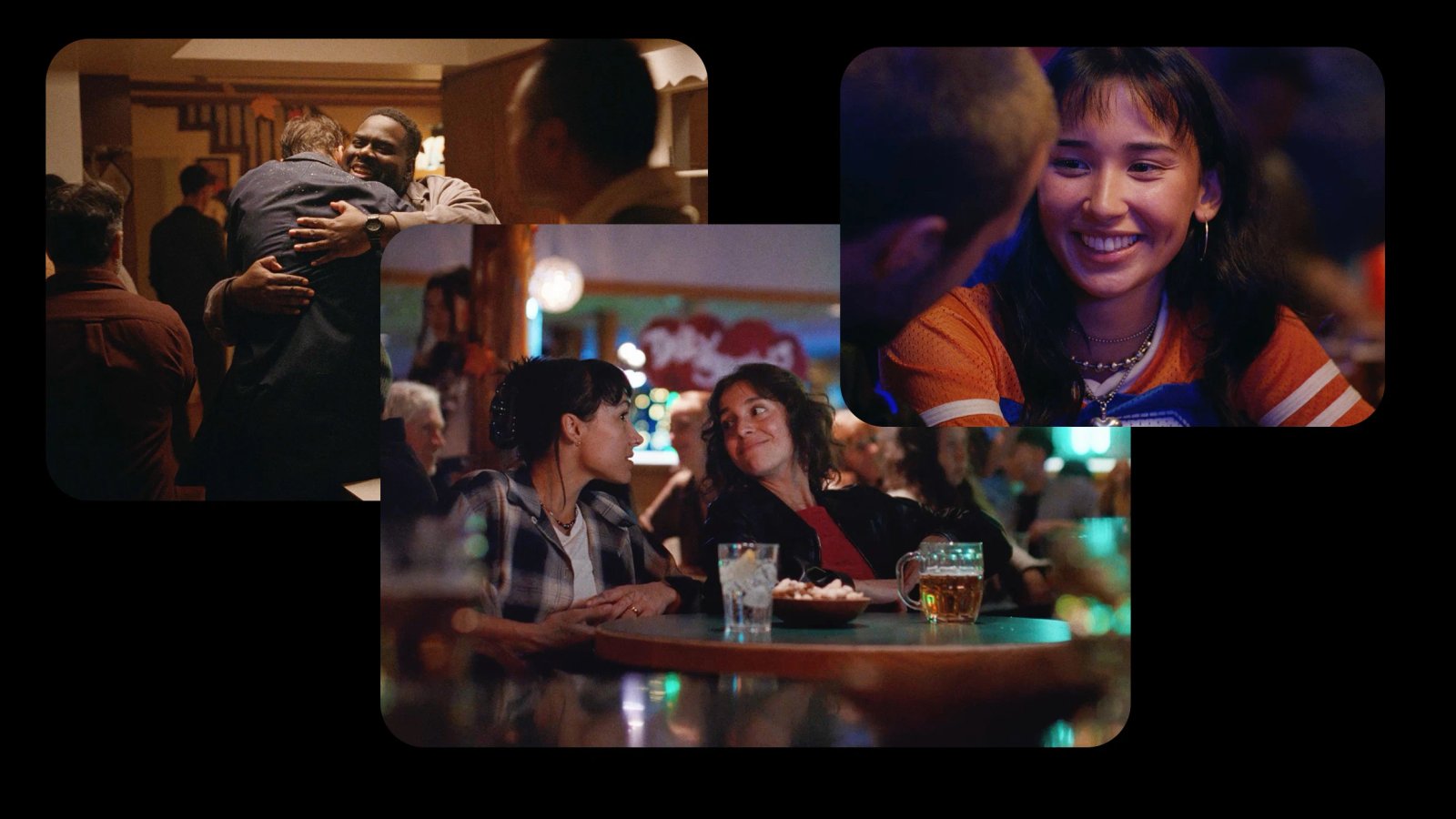
Last year, travel group AAA estimated about 80 million Americans traveled over the Thanksgiving holidays. It was the busiest Thanksgiving ever at airports across the country, and some reports are saying those records could be shattered this year.
A lot of that traveling will be done by young adults making their way home from school or new cities to see family and reconnect with old friends. That last part is the crux of Facebook’s first brand campaign in four years.
In a new ad called “Home For The Holidays,” we see people making their way back home and various get-togethers being organized on Facebook. Created by agency Droga5 and set to Bob Dylan and Johnny Cash’s “Girl From the North Country,” the spot expertly conjures the comfort and emotional security that only the warm embrace of old friends and familiar surroundings can provide.
The goal here is to reintroduce Facebook to a new generation of users and remind people “what made Facebook magic in the first place,” according to the campaign press release. It’s just the start of the brand’s efforts in the coming months to reach younger audiences, including upcoming partnerships with Sports Illustrated and 10 American universities tied to college sports.
Facebook’s Global Marketing Director Briana de Veer says that one in four young adults (ages 18–29) in the U.S. and Canada use Facebook Marketplace. Hundreds of thousands of young adults in the U.S. and Canada create Facebook Dating profiles every month, and young adult matches are up 10% year over year. “We see young adults using Facebook to help them navigate life stages,” says de Veer. “They move into their first apartment and turn to Marketplace to help furnish it on a tight budget, or using Facebook Dating to find love or joining Facebook Groups to meet people in a new city, for example.”
Sounds great. Except compared to Facebook’s reality in culture, the new ad is as much a fantasy as hooking up with your high school crush on that next trip home. This may be Facebook’s first brand campaign in four years, but it’s picked up exactly where it left off in serving up an image of a brand that neither reflects nor defends who it actually is in the real world. Because in the real-life version of this spot, these old friends would likely be in the bar screaming at each other over political hot takes, healthcare facts, and anti-immigrant tirades.
Look, we all know advertising is about aspiration. For brands, it’s about projecting the roles they want to play in our lives. For us, it’s about seeing an image we might want to identify with. But marketers need to balance between that manufactured ideal and the reality of how they exist in the world. There’s aspiration and then there’s delusion, and it’s a brand’s job to know the difference.
The bad stuff
It’s hard to ignore the obvious dichotomy between Facebook’s ads and its real-life decisions. In January, Facebook founder and CEO Mark Zuckerberg announced a gaggle of changes to the company’s content moderation, including cutting its fact-checking program, which was originally established to fight the spread of misinformation across its social media apps. “It’s time to get back to our roots around free expression,” Zuckerberg said in a video announcing the changes. He also acknowledged there would be more “bad stuff” on the platforms as a result of the decision.
“The reality is that this is a trade-off,” he said. “It means that we’re going to catch less bad stuff, but we’ll also reduce the number of innocent people’s posts and accounts that we accidentally take down.”
Nicole Gill, founder and executive director of the digital watchdog organization Accountable Tech, told The New York Times that this was “reopening the floodgates to the exact same surge of hate, disinformation and conspiracy theories that caused Jan. 6—and that continue to spur real-world violence.”
A former Meta employee told Platformer, “I really think this is a precursor for genocide […] We’ve seen it happen. Real people’s lives are actually going to be endangered.” Amnesty International said these changes posed “a grave threat to vulnerable communities globally” and drastically increased “the risk that the company will yet again contribute to mass violence and gross human rights abuses—just like it did in Myanmar in 2017.”
That’s not all, though. As Meta plows full steam ahead on building AI ”superintelligence,“ it’s leaving a path of unconsidered consequences in its wake. In August, Reuters reported that an internal Meta memo revealed that the company’s rules for AI chatbots had permitted “sensual” chats with children.
Not quite the warm n’ fuzzy vibes the brand is going for.
I asked de Veer about how the company thinks about balancing the parts of the brand they want to reflect back into the world with a campaign like this, and the obvious challenges that remain. “We continue to invest in keeping people safe on our platforms and removing harmful content that goes against our policies,” she says. “That is critical foundational work that makes it possible for people to see and experience the core value of the brand, which is the focus of this campaign.”
Back to the Future
Back at the end of 2020, I called Facebook the Worst Brand of the Year, based on the Grand Canyon–size gap between the company it was projecting itself to be, and the one defined by its actual, real-world actions. Back then, I called Facebook out for how it portrayed itself as a warm and fuzzy marketplace of ideas while knowingly facilitating the spread of health misinformation and political falsehoods.
Sound familiar?
In 2021, the last time Facebook launched a brand campaign, that ol’ familiar feeling was back again. This time it was a spot called “The Tiger & The Buffalo,” which somehow hoped that dropping some friends inside a 1908 Henri Rousseau painting would distract us from revelations in The Wall Street Journal’s Facebook Files, the testimony of whistleblower Frances Haugen, and a study on how climate change denial was spreading unchecked on Facebook.
The more things change, the more they stay exactly the same at Facebook, it seems. I actually feel bad for ad agency Droga5, which has crafted some truly impressive ads for the brand over the years, including two of the very best to come out of COVID—”Never Lost” and “Survive” about a beloved NYC restaurant called Coogan’s.
Not only is the Facebook algorithm still fine-tuned to feed you the angriest, most controversial content it can, it’s also pulling back on the efforts to combat disinformation and vitriol that are known to incite violence. With its new campaign, it’s offering yet another distraction from its problematic role in culture.
The strategy here is to remind people why Facebook ever mattered in the first place. It’s to harken back to the halcyon days between 2006 and 2010, when it was actually a tool to primarily connect with people. Two decades later, Facebook is all that and a whole lot more—plus, you know, rage-baiting. Instead of living in the past, the brand needs to celebrate its best while also actively working to solve its worst. It’s definitely not a chair.
Perhaps the closest the brand has come to doing just that was in an ad called “Here Together.” It acknowledged what Zuckerberg recently called the “bad stuff,” and defined its role in regulating it, saying “from now on, Facebook will do more to keep you safe and protect your privacy, so we can all get back to what made Facebook great in the first place.”
That was in 2018, when all the people in “Home For The Holidays” were still in high school. It’s time this brand grew up, too.
The early-rate deadline for Fast Company’s World Changing Ideas Awards is Friday, November 14, at 11:59 p.m. PT. Apply today.

